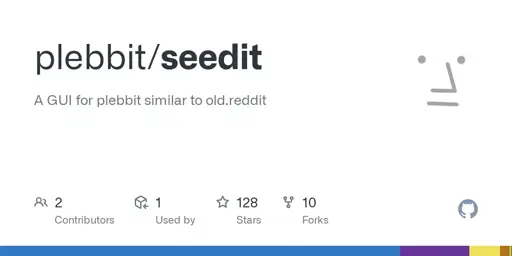

Yet is hosted on Github and presumably requires a working DNS and HTTPS system to download.
Incorrect, Seedit works similarly to a BitTorrent client, you just open the app and you’re connected p2p to the communities, similarly to how you connect p2p to torrent seeders.
Except your ISP and/or government.
Your ISP and/or government can’t stop you. Just like they can’t stop you from downloading a torrent or using Bitcoin with a full node. They can make you life harder, tracking you, sending you to jail etc but they can’t prevent the initial p2p connection.
So your supposedly non-centralized project requires external hosting? It’s like NFTs where the images were just worthless links. :P Also, uh, base64 encoding is a thing and clients will absolutely start supporting it.
Posting images isn’t required. Why would you want to decentralize media hosting anyway (which is impossible)? To share CSAM? Not sure why you’d want to do that. Also, no, base64 encoding isn’t allowed in the protocol, you literally can’t publish it to the p2p network because there are character limits.
… Isn’t this what you’ve been trying to avoid?
Nope, how would that make any sense? A community is such if it’s moderated. If it’s unmoderated, it’s not even a community, it would be fully unusable because of spam.
Finally, a mention of content discovery. How is your recommendation system implemented? What decides whether a community is worth being recommended?
Our clients use https://github.com/plebbit/temporary-default-subplebbits also you can query the ethereum and solana blockchains for .eth and .sol domains respectively with text records/subdomains of value “subplebbit-address” (see: https://dune.com/plebbit/plebbit-protocol) and we’ll support more decentralized domain systems later.
Wait… Isn’t your whole pitch that it was censorship resistant? Can you clarify your threat model here, who are you actually worried about censoring your platform?
Again, it works like torrents. Torrents are censorship resistant, yet torrents aren’t private because your IP address is in the p2p swarm. Law enforcement can use expensive fingerprinting software to catch the big fish, for very illegal content sharing.
And using a completely unknown new service and protocol isn’t? I’m sure there’s tons of documentation out there for hosting Mostodon or Lemmy servers.
Well, which is harder in your opinion, opening a reddit-like app and create a sub (and that’s it, it runs a p2p full node automatically for the sub) or: buy a domain with ssl, set up the server, pay for the server, set up moderation for the whole instance, get censored, get sued, get defederated by other instances, prevent spam, etc.
I agree with this, but not for the reasons you’ve stated.
You’ll see the light.
P2P scales much worse than centralized systems. Centralized systems scale at N connections per node, while P2P systems scale at N^2 connections per node.
Wrong. Real-world P2P systems don’t use full mesh and don’t require O(N²) connections. They typically scale with far fewer connections per node (e.g. O(log N)), while centralized systems hit bottlenecks at O(N) connections to a single server.
You know what, I don’t mind this project. We need a place for far right people to go to to avoid “censorship” (getting banned from a subreddit for doing nothing but throwing slurs at people) and collaborate on their “plans” (killing minorities) on a platform that is “private” (easily traceable, unencrypted and linked to your IP address).
Plebbit is neutral, anyone can use it (left wing, right wing, apolitical etc), nobody can stop anyone from using it. And it can’t get taken down nor shut down, it’s eternal.

I agree, this is a problem we haven’t addressed yet. We’re working on it, soon Seedit will have its own communities specific to a reddit-like user experience. All the 4chan-like communities will be transferred to the Plebchan client. I’m talking about “default communities”, i.e. those recommended by the app when first opening it (when the user isn’t subscribed to any subplebbit address yet), but of course nobody can stop users from connecting p2p to any community, no matter from which client.